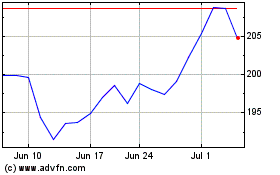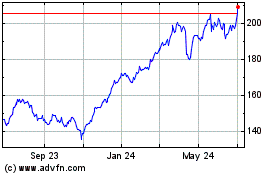Fed's Tarullo to Biggest Banks: Stress Tests Likely Will Get Harder
November 23 2015 - 1:10PM
Dow Jones News
The Federal Reserve's point man on bank regulation said the
central bank's annual stress tests are likely to get harder for the
very largest banks.
Fed governor Daniel Tarullo said Monday that the Fed is likely
to increase the minimum capital required for banks to pass the
tests.
"I think there is a pretty good chance, in fact I think it's
more than a pretty good chance, that in the end of the day…there
will be some net increase in the post-stress minimum capital
requirements," he said in an interview on Bloomberg TV.
That outcome has been among large banks' biggest fears since
this summer when the Fed raised capital requirements for eight of
the largest U.S. banks. Those requirements apply during normal
times, but the Fed left it unclear whether they would apply under
the stress tests, which simulate a severe recession.
Firms such as J.P. Morgan Chase & Co., Citigroup Inc. and
Bank of America Corp. already have shed or shrunk business lines
and spent millions of dollars rebuilding internal systems in order
to pass the current versions of the stress tests. By raising the
"post-stress minimum," the Fed effectively would be forcing them to
take further actions to shed risky assets or raise more
capital.
"With respect to the largest banks, you do have to be mindful of
the fact that the financial crisis and the great recession cost
this country trillions and trillions of dollars," Mr. Tarullo said
in defense of the Fed's rules. "It's incumbent on us to make sure
that the vulnerabilities that could lead to widespread financial
distress are addressed."
In the wake of the financial crisis, the Fed has made the stress
tests the centerpiece of its supervision of the very largest U.S.
banks. If banks don't pass the tests, they are restricted from
returning money to shareholders through dividends or buybacks.
The stress tests have two main components: an evaluation of
banks' risk-management systems and a calculation of how much
capital, or shareholder equity, banks must have in place to absorb
losses.
Mr. Tarullo on Monday was referring to the capital calculation.
In order to pass that part of the test, banks must show they have
enough capital to absorb heavy losses and still stay above minimum
capital requirements set by the Fed.
He said the Fed hasn't decided exactly how it would raise the
minimum, but suggested two options. Each likely would affect only
the very largest U.S. banks.
One way, Mr. Tarullo said, would be incorporating a higher
capital requirement, known as a "surcharge," that only applies to
eight of the largest and most systemically important U.S. banks.
The Fed adopted the surcharge this summer, requiring banks to
follow it during normal times. But it left unanswered whether those
eight banks would have to meet the higher minimum during the stress
tests.
Another approach the Fed could take, Mr. Tarullo said, would be
to raise the capital requirements in a manner that takes into
account "shared counterparties" between the very largest U.S.
firms. Since the crisis, the Fed has been concerned about
connections between large firms that could make vulnerabilities at
one of them spread to another.
The Fed is engaging in a broad review of the stress tests.
Earlier this month, Mr. Tarullo said that review could lead the Fed
to relax rules for some of the smaller banks subject to the tests.
About 30 banks with more than $50 billion in assets take the test
each year.
Write to Ryan Tracy at ryan.tracy@wsj.com
Access Investor Kit for "CitiGroup Inc"
Visit
http://www.companyspotlight.com/partner?cp_code=P479&isin=US1729674242
Subscribe to WSJ: http://online.wsj.com?mod=djnwires
(END) Dow Jones Newswires
November 23, 2015 12:55 ET (17:55 GMT)
Copyright (c) 2015 Dow Jones & Company, Inc.
JP Morgan Chase (NYSE:JPM)
Historical Stock Chart
From Mar 2024 to Apr 2024

JP Morgan Chase (NYSE:JPM)
Historical Stock Chart
From Apr 2023 to Apr 2024
